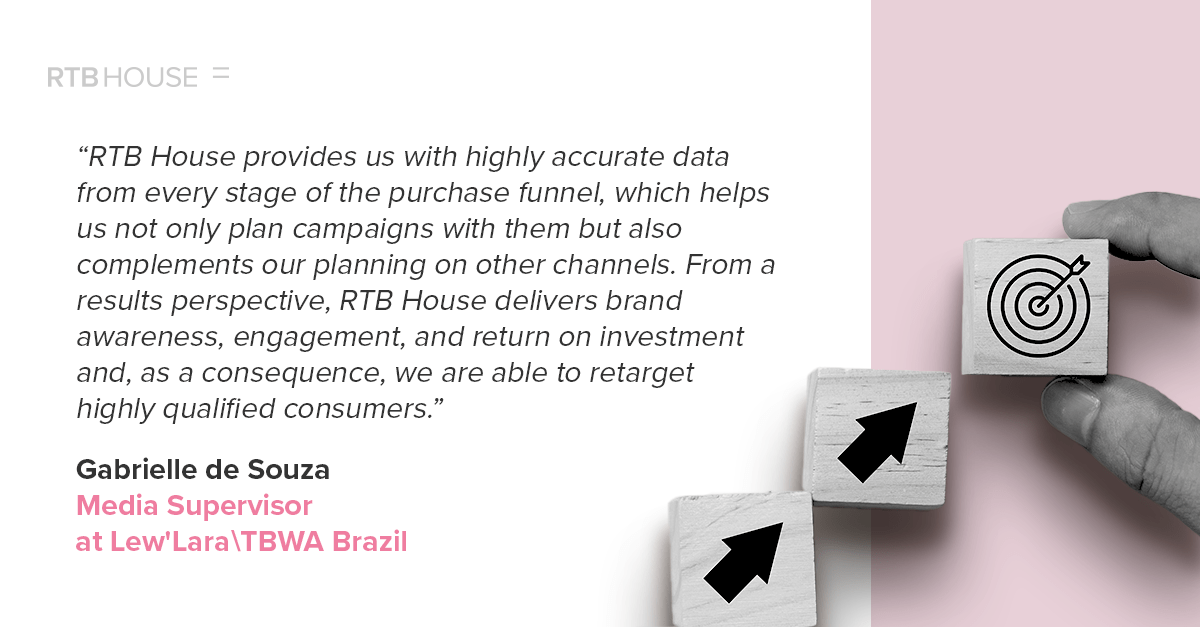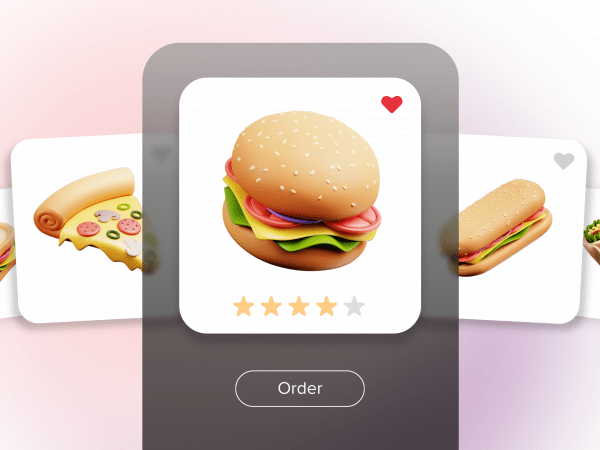Last Updated on: 16th December 2022, 12:52 pm
Tasked with making client budgets deliver maximum results, media agencies have a laser focus on cost optimization and martec trends throughout the planning and execution of digital campaigns. In this article, Gabrielle de Souza, Media Supervisor at Lew’Lara\TBWA Brazil—a leading Brazilian media agency—shares her experiences planning and optimizing campaigns for global brands and how technology platforms can empower agencies to extract maximum value.
Table of Contents:
- Budget optimization in the campaign planning process
- The role of media partners
- Overcoming challenges and seizing opportunities
- Gabrielle’s top tips for effective budget planning and optimization
- How RTB House helps LewLara
- The future of advertising, budget planning, and optimization
Budget optimization in the campaign planning process
Where possible, look at how previous campaigns have performed for clients; this is the best foundation for effective budgeting when planning future campaigns. “We always treat each brand as an individual and tailor our planning process as there is no one-size-fits-all approach,” says Gabrielle.
Knowing how different strategies and martech trends have played out in the past enables agency teams to eliminate poor-performing channels, media partners, formats, times of the day, days of the week, and to look at the future of advertising. “We also look closely at the characteristics of the market(s) in which each brand operates and the audience(s) they want to reach. It’s important to do this for every campaign as things change continually and, in order to get the best results, you need to have the freshest data and insights available to you.”
When it comes to putting the plan down on paper, so to speak, Gabrielle advises using a balance of mathematics, market intelligence, and human science. According to Gabrielle, “the human science aspect is particularly important as this is what enables us to truly understand and predict how consumers will respond to a campaign, which is the ultimate deciding factor as to whether a campaign is a success or not.”
The role of media partners
Gabrielle’s team evaluates every potential media partner by looking at expected results vs. cost. Gabrielle’s advice to agencies is to “only work with partners that provide you with data, projections, and estimated results; otherwise, you leave yourself open to unnecessary risk. There is no reason that a reputable media partner shouldn’t be willing to share these insights. If you come across a partner that won’t, ask yourself why and what they might be hiding.”
Overcoming challenges and seizing opportunities
When budgets are small, it’s challenging to address the entirety of the digital media opportunity and all martec trends. This means that agencies have to work towards a central objective—for example, sales or brand awareness—and create a long-term plan and work each stage of the purchase funnel separately.
With larger budgets, the challenge is to find channels and media partners that can help agencies achieve multiple goals throughout the purchase funnel and improve the user journey at every stage. In some ways, larger budgets can present bigger challenges because there are more goals across all stages of the purchase funnel to plan towards and, thus, more options to evaluate.
Different verticals also present different challenges, and you need to have the flexibility to cater to nuances such as the increased pace of FMCG or the slower purchase funnel for cars. “From an agency perspective, it’s vital to ensure that there is a wide breadth of experience internally in order to offer the best possible service to clients,” says Gabrielle.
Good to know: What is the Purpose of Branding in the FMCG Sector?
Gabrielle’s top tips for effective budget planning and optimization
- Understand your client’s business inside out. Understand their market, positioning, needs, previous pain points, and what they expect from their media investment
- Create a strategy that clearly solves any previous challenges and make sure that each decision you have made along the way is backed up with robust data including that from martech trends
- Make sure your plan covers each objective. This will vary for each client but could include clicks, sessions, time spent on site, engagement, complete views, view-through rate (VTR), and sales
- Once campaigns are live, understand how they are performing against all your goals. Look for differences across channels, creative formats, media partners, targeting, etc.
- Take time to evaluate what you’re seeing; it’s a learning curve, not a race. This will minimize the risk of making unnecessary changes or making changes at the wrong time
How RTB House helps LewLara

“RTB House provides us with highly accurate data from every stage of the purchase funnel, which helps us not only plan campaigns with them but also complements our planning on other channels. From a results perspective, RTB House delivers brand awareness, engagement, and return on investment and, as a consequence, we are able to retarget highly qualified consumers,” says Gabrielle.
The future of advertising, budget planning, and optimization

“Over the past 12 months, new attribution models have emerged. As these become mainstream, I believe that planning will change and follow these trends. As this evolution takes place, it will be vital for agencies to continually analyze each channel and media partner because changes to attribution modeling can affect performance metrics.”
If she could have three wishes granted for the future of advertising in regards to budget planning and optimization, they would be:
- More platforms that provide demonstrable value to campaign planning, help streamline the process, and deliver on their promise
- More accurate predictions from media partners resulting in less variation between predicted and actual performance
- Better audience data from platforms. Gabrielle concludes, “Ultimately, the better we know our target consumers, the better we can plan!”
Good to know: What are the Differences Between Brand Visibility and Brand Awareness?
If you have any questions, comments or issues, or you’re interested in meeting with us, please get in touch.




